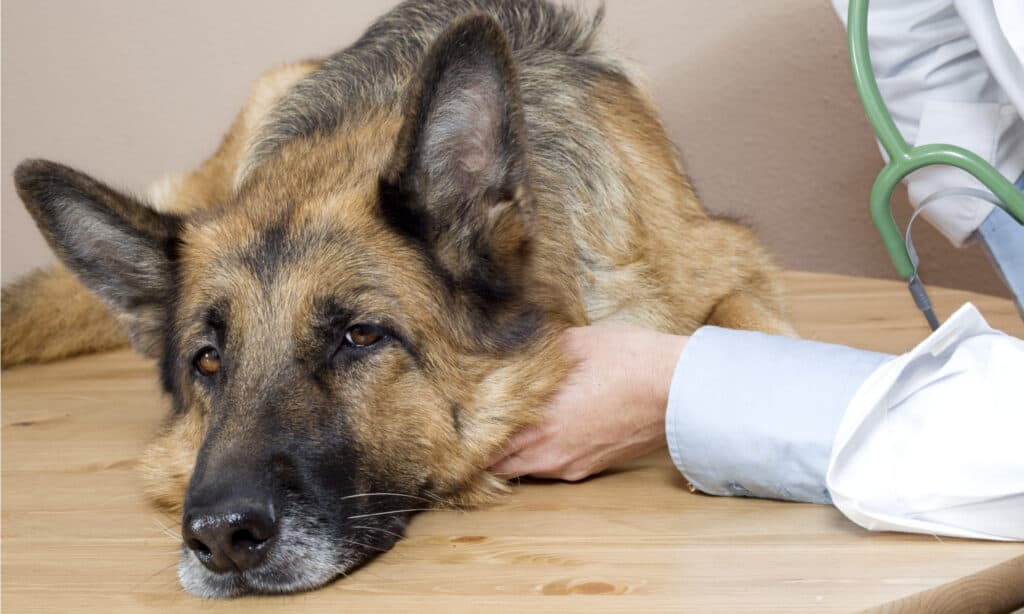As a pet owner, you want to protect your dog by keeping them safe and healthy. But how do you do that when you’re ill? Being sick is difficult enough on its own without worrying about potentially spreading a virus to your furry friend. Discover the sicknesses dogs can get from humans and how to prevent the spread of harmful germs.
Can I Get My Dog Sick If I’m Sick? And How?

Humans can pass certain illnesses to their dogs through a process called zoonosis.
©didesign021/Shutterstock.com
Unfortunately, yes. Humans can pass certain illnesses to their dogs (and vice versa) through a process called zoonosis. Zoonosis is defined as any disease or infection that is naturally transmissible from vertebrate animals to humans. There are over 200 known types, but not all involve canines. These pathogens can be viral, parasitic, or bacterial. And they spread in several ways. You can get sick from dogs, or your dog can get sick from you typically through direct contact with skin, fur, bodily fluids, and feces. Other animals, especially those used in the agricultural industry, can spread disease through food, water, and the environment.
Illnesses Humans Can Pass To Dogs

Humans can infect dogs with the flu, bacterial infections, MRSA, tuberculosis, ringworm, and mumps.
©Roger costa morera/Shutterstock.com
One of the main questions pet owners ask is if dogs can get the flu from humans. And the answer is yes, but only certain strains. Human influenza, particularly H1N1 and H3N2, can be passed through zoonosis. And while humans report symptoms, such as a cough and runny nose, dogs do not become ill from the human flu. This is good news for you if you like to snuggle with your pup during flu season.
Humans can also pass bacterial infections to their dogs, like salmonellosis and Campylobacter jejuni. They are transmitted through fecal-oral contact and can cause diarrhea, vomiting, fever, and decreased appetite. The spreading of bacteria often happens when humans don’t wash their hands after using the restroom and touch their dog’s face or allow them to lick their hands.
MRSA, an infection caused by staph bacteria, can enter a dog’s system by contact with breaks in their skin. Not only can MRSA cause skin infections, but it can also affect the respiratory system and urinary tract. Other illnesses and infections that can be passed from humans to dogs include Tuberculosis, ringworm, and mumps.
Can I Give My Dog Covid-19?
The coronavirus SARS-CoV-2 causes symptoms in humans, like fever, cough, and shortness of breath. While most cases are mild, others are more severe and require urgent hospitalization. A small percentage of dogs have tested positive for Covid, and health officials believe they contracted the virus through close contact with infected humans. While this may sound troubling to pet owners, it is not a cause for serious concern. Dogs with Covid seem to exhibit mild symptoms, and the risk of them spreading the virus to other people is low.
Diseases/Illnesses That Animals Can Transmit To Humans

Dogs can spread viruses and infections through infected feces and bodily fluids.
©BONDART PHOTOGRAPHY/Shutterstock.com
There are only a handful of illnesses that dogs can get from humans, but many more that humans can get from dogs.
Along with the previously mentioned infections and viruses, dogs can also spread these to humans:
- Rabies – causes severe neurological symptoms once contracted through a bite or scratch.
- Leptospirosis – can spread through your dog’s urine and causes a high fever and digestive issues.
- Brucellosis – spreads through general touch contact and causes flu-like symptoms.
- Capnocytophaga – when an infected dog bites or scratches a human, it can produce painful blisters.
- Giardiasis – causes diarrhea and abdominal pain and spreads through infected feces.
- Parasitic worms – hookworms, tapeworms, and roundworms can spread through feces and infected fleas. These parasites can cause minor to severe symptoms and complications.
- Echinococcosis – spreads through feces and causes internal cysts.
- Cryptosporidiosis – causes diarrhea, cramping, nausea, and vomiting. You can contract this infection by ingesting infected dog feces.
How To Prevent the Spread of Zoonotic Illnesses
Here are some things you can do to prevent zoonotic diseases from spreading:
- Avoid getting bites and scratches.
- Pick up your dog’s feces using gloves and dispose of it in a sealed plastic baggie.
- Wash your hands thoroughly after handling feces, food/water bowls, and toys.
- Limit close contact with your dog if you have a zoonotic infection or disease.
- Keep you and your pet up-to-date on vaccinations for the flu, Covid, rabies, and others.
- You may not always know when your dog is sick or suffering from things like parasites. You should take your dog for regular vet visits to stay on top of its (and your) health.
Up Next:
- Can You Get Worms From Dogs? What Science Says
- Can Dogs Get COVID-19? Symptoms, Risks, and Prevention
- Can Humans Get Roundworms From Dogs?
The photo featured at the top of this post is © Prystai/Shutterstock.com
Ready to discover the top 10 cutest dog breeds in the entire world?
How about the fastest dogs, the largest dogs and those that are -- quite frankly -- just the kindest dogs on the planet? Each day, AZ Animals sends out lists just like this to our thousands of email subscribers. And the best part? It's FREE. Join today by entering your email below.
Sources
- World Health Organization, Available here: https://www.who.int/news-room/fact-sheets/detail/zoonoses
- Wiley Online Library, Available here: https://onlinelibrary.wiley.com/doi/abs/10.1128/9781555819231.ch5
- Library of Science, Available here: https://bibliotekanauki.pl/articles/1036127
- American Family Physician, Available here: https://www.aafp.org/pubs/afp/issues/2007/1101/p1314.html
Thank you for reading! Have some feedback for us? Contact the AZ Animals editorial team.






